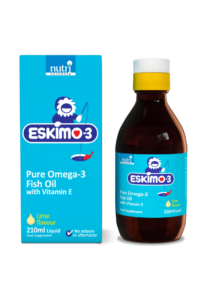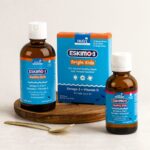





Eskimo-3 Liquid Lime 210ml
£34.96 Original price was: £34.96.£27.96Current price is: £27.96.
Eskimo-3 Liquid
Eskimo Fish oil supplements, which contain omega-3 fatty acids such as EPA (eicosapentaenoic acid) and DHA (docosahexaenoic acid), can be beneficial for children’s health.
Omega-3 fatty acids are essential for the development and functioning of the brain and have various other health benefits. Here are some considerations regarding the use of fish oil for kids:
1. **Brain Development:** Omega-3 fatty acids, particularly DHA, are crucial for the development of the brain and nervous system in children. DHA is a major component of the brain, and it plays a key role in cognitive function and visual development.
2. **Cognitive Function:** Some studies suggest that omega-3 supplementation may have positive effects on cognitive function, including attention, memory, and problem-solving skills in children.
3. **Behavioural and Emotional Health:** There is evidence to suggest that omega-3 fatty acids may play a role in behavioural and emotional health.
Some studies have explored their potential benefits for conditions like attention deficit hyperactivity disorder (ADHD) and mood disorders.
4. **Eye Health:** DHA is essential for the development of the retina, and adequate intake of omega-3s may contribute to healthy vision in children.
5. **Reduced Risk of Allergies:** Some research suggests that Eskimo omega-3 fatty acids may help reduce the risk of allergies in children.
When considering fish oil supplements for kids:
– **Consult with a Pediatrician:** Before giving any supplements to children, it’s crucial to consult with a pediatrician or healthcare professional.
They can provide personalized advice based on the child’s individual health needs.
– **Choose Appropriate Formulas:** There are fish oil supplements specifically formulated for children, available in various forms such as flavored liquids, chewable capsules, or gummies. Ensure that the product is suitable for the child’s age group and preferences.
– **Check for Purity and Quality:** Choose high-quality fish oil supplements that are purified to remove potential contaminants, such as mercury. Look for products that have been tested by third-party organizations for quality and purity.
– **Dosage Considerations:** Follow the recommended dosage guidelines provided by the pediatrician or the product’s packaging. Dosages may vary based on the child’s age, weight, and health condition.
– **Include Omega-3-Rich Foods:** In addition to supplements, encourage the inclusion of omega-3-rich foods in the child’s diet, such as fatty fish (salmon, mackerel, sardines), flaxseeds, chia seeds, and walnuts.
It’s important to note that while Eskimo omega-3 supplements can be beneficial, they are not a replacement for a well-balanced diet. Emphasizing a diet rich in nutrients, including a variety of fruits, vegetables, whole grains, and lean proteins, contributes to overall health.
Always seek guidance from a healthcare professional before introducing any supplements into a child’s routine.
| Ingredients: |
| One 5ml teaspoon typically contains: |
| Omega-3 fatty acids | 1,500 | mg |
| Providing: |
| EPA (eicosapentaenoic acid) | 750 | mg |
| DHA (docosahexaenoic acid) | 500 | mg |
| Vitamin E (mixed tocopherols) | 14 | mg |
| Other ingredients: |
| Ascorbyl palmitate |
| Lecithin |
| Lime oil |
Recommendation:
1 teaspoon (5ml) daily with food, or as directed. After opening store in refrigerator and use within 2 months.
















Reviews
There are no reviews yet.